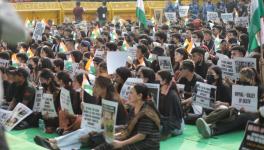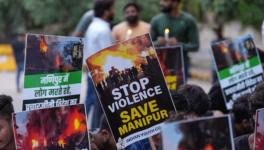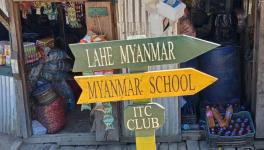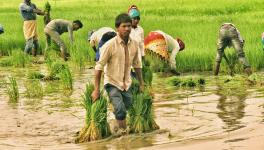Manipur Braces For Tension as Governments Mull Stripping SC Status From Kuki and Chin Tribes
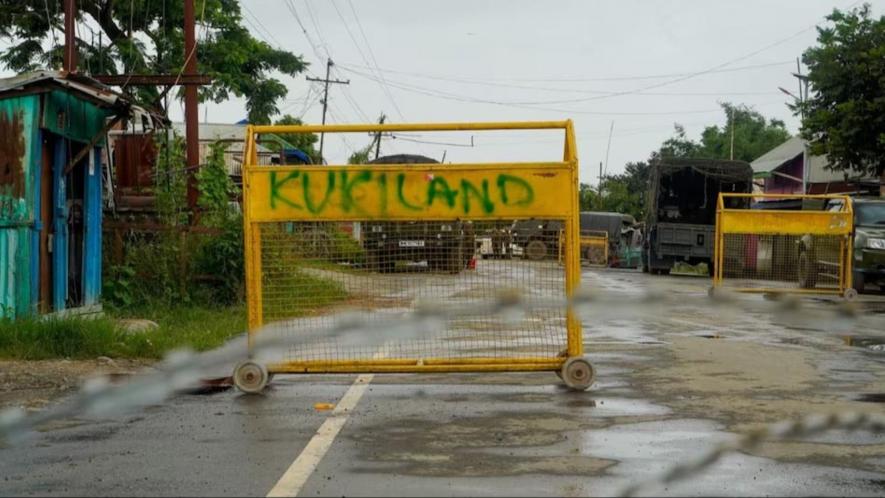
Imphal/New Delhi: The past week has seen a resurgence of demands with the potential of exacerbating the conflict and divide in the north-eastern state of Manipur. Manipur has not quite recovered from the outburst of violence since May 3, 2023 that has left over 200 dead and over 55,000 in the state’s hapless relief camps
Kuki-Zo bodies, in a widely reported statement in the Hindu, have opposed this move to review ST status of certain tribes, a step strongly condemned by the Indigenous Tribal Leaders Forum (ITLF) and the Zomi Council Steering Committee (ZCSC). The ITLF sees this as a bid by Biren Singh government to change ST criteria to deprive Kuki-Zo tribals of their rights and land; Zomi body says it will only widen existing divide.
The Ukhrul Times reported that the chief minister has stated, in response to such demands from other local groups that a “Committee will be formed” to look into the matter.
Chief Minister N Biren reportedly said that a committee comprising all the tribal communities of Manipur will be formed to deliberate on demand for deletion of Chin-Kuki from the Scheduled Tribes list of the state. The Committee’s report will then be forwarded as proposals to the Union Ministry of Tribal Affairs, he added. The controversy broke out after the remarks made by N Biren Singh who was speaking on the side-lines of the 190th death anniversary of Maharaj Gambhir Singh observed at the late King’s Samadhi in Langthabal.
Taking to X, N Biren also said, “Someone has to take risks in order to save the present and future generations. Sacrifices must be made to protect the youths from drugs and various elements which are threatening the state. The state government has been taking up these challenging tasks by abiding the laws and values enshrined in the Constitution.”
Someone has to take risks in order to save the present and future generations. Sacrifices must be made to protect the youths from drugs and various elements which are threatening the state.
The state government has been taking up these challenging tasks by abiding the laws and… pic.twitter.com/6vvMPD5Oul
— N.Biren Singh (@NBirenSingh) January 9, 2024
Asked about the stand of the state government on whether “all Kuki tribes would be listed as ST”, Singh said Tuesday, January 9: “They were included in the list, but how it was included has to be re-examined. So before giving any comment, we have to form a committee consisting of all tribes, then only will we be able to send a complete proposal for deletion or inclusion… Anything might be… but after the committee is formed.”
This controversial statement by Singh, a chief minister much berated for his disinclination to engage in any dialogue process between the various tribes, is seen as the start of another flash point for a conflict that has not been satisfactorily controlled.
Moreover, this step of the state government does not come in isolation.
In a separate action that could be seen to be happening in tandem, the Union Ministry of Tribal Affairs had recently written to Additional Chief Secretary of Manipur asking the state administration to examine the representation seeking deletion of the “Nomadic Chin-Kuki” from the list of Scheduled Tribes in Manipur made by Maheshwar Thounaojam, National Secretary of the Republican Party of India (Athawale). The letter from the ministry reportedly made it clear that recommendation from the state government is a pre-requisite to process the case further.
Meanwhile, the Indigenous Tribal Leaders’ Forum (ITLF) and the Zomi Council Steering Committee (ZCSC) on Wednesday, January 10, strongly condemned the move to review the Scheduled Tribe (ST) status of certain Kuki-Zo communities in Manipur amid the ongoing ethnic conflict in the State.
Original inhabitants
The Hindu also reported, in detail, on January 8, 2024, how the representation was sent to the Union Tribal Affairs Minister by the Republican Party of India (Athawale) National Secretary in Imphal. The Manipur government has, through this, been asked by the Centre to examine a representation seeking deletion of the “Nomadic Chin-Kuki” from the list of Scheduled Tribes in Manipur. The Union Tribal Affairs Ministry said that a representation seeking delisting was made by Maheshwar Thounaojam, National Secretary of the Republican Party of India (Athawale), who is based in Imphal.
The language of the representation made in a dangerously posed argument that can fuel exclusivist propaganda, even xenophobia, the representation marked to Tribal Affairs Minister Arjun Munda on December 11, 2023, cites a Supreme Court judgement from January, 2011 to suggest that “all Scheduled Tribes (Adivasis) shall be original inhabitants of India”. He then goes on to argue that in light of this judgement “the Kukis including Zomis of Manipur do not qualify as Scheduled Tribes of Manipur on the ground that they are not original inhabitants of Manipur”. Interestingly, however, a closer analysis of the cited judgement showed that the case had nothing to do with deciding the definition of a tribe. It was a criminal appeal in a case of an atrocity against a tribal Bhil woman in Maharashtra. The SC had upheld the conviction and in the process remarked that ancestors of present-day STs in India were most likely the original inhabitants of the land.
Meanwhile, The Indian Express also reported how, last month, December 2023, Meitei leader Maheshwar Thounaojam, who is the national secretary of the Republican Party of India (Athawale), sent a petition to the Union Ministry of Tribal Affairs seeking a review of the ST list in the state, claiming that “the Kukis including Zomis of Manipur” do not qualify for it “on the ground that they are not original inhabitants of Manipur”.
Thounaojam’s representation, sent on December 13, was forwarded by the Ministry of Tribal Affairs to the Additional Chief Secretary of the Tribal and Hill Affairs Department of the Manipur government on December 26. The Union ministry stated that the state government’s recommendation was a prerequisite to process any proposal for inclusion or modification in the list of STs.
Distinguish between the indigenous and others: In the 17-page representation along with hundreds of pages of annexures, Mr. Thounaojam, as signatory to the representation, has tried to argue that indigeneity should be the principal criterion for defining Scheduled Tribes in the country, further requesting the government to accordingly determine “who should be correctly in the Scheduled Tribes list of Manipur”, also making a case for the Meiteis’ inclusion.
The criteria used by the government to declare communities as STs were decided upon by the Lokur Committee in 1965 and continue to be in use today. These are: primitive traits, distinctive culture, geographical isolation, shyness of contact with the community at large, and backwardness. The representation further argues that the inclusion of a few more entries in Manipur’s ST list over the years — such as “Any Mizo (Lushai) tribes”, “Zou”, and “Any Kuki tribes” — is “objectionable”. Arguing that the loose and vague definition without specific tribe names, enabled “illegal immigrants and refugees from Myanmar, Bangladesh and other Indian States” to settle in Manipur and claim ST status.
Besides the detailed representation also contended that the entries “Any Mizo (Lushai) Tribes” and “Zou” were added to the ST list in 1956, despite the absence of these entries in the report of the Kaka Kalelkar Commission, which had also specifically recommended that individual tribe names should be mentioned in the list as opposed to “ambiguous” tribe names. Further, the representation claimed that the “Zou” tribe were from a foreign country -— Myanmar’s Chin state — that finds no mention in pre-independence India Censuses and, therefore, should not be in the ST list of Manipur.
It added that similarly, “Any Kuki tribes” was introduced to the ST list during the Atal Bihari Vajpayee government in 2003. “As the particular names of tribes to be covered under the tribe name ‘Any Kuki Tribes’ are not specified, there is clandestine room for enrolment in ST list of people disguised as Kukis whether refugees or illegal immigrants from foreign countries and other states who are not citizens of Manipur by birth,” Mr. Thounaojam’s representation said.
Interestingly, according to government records, a proposal to include the Meitei community in the ST list of Manipur was rejected once by the Office of the Registrar General of India in 1982 and again in 2001 by the erstwhile state government, as reported by The Hindu in 2023. The Office of the RGI had said that the Meiteis do not appear to possess tribal characteristics based on available information. The Manipur government, in 2001, agreed with the Office of the RGI, further saying that Meiteis were the “dominant group” in the state, were Hindus, and had already been listed in the Other Backward Classes category.
In a letter dated December 26, 2023, the Union government said the process of inclusion or exclusion from ST list requires the proposal to originate from the concerned State government and hence it was sending the representation to the State government for its recommendation.
Following weeks of these moves, a sharp response was forthcoming from the Indigenous Tribal Leaders’ Forum (ITLF) and the Zomi Council Steering Committee (ZCSC). Both bodies, on January 10 strongly condemned the move to review the Scheduled Tribe (ST) status of certain Kuki-Zo communities in Manipur amid the ongoing ethnic conflict in the State.
The ITLF issued a statement where it referred to the Meitei community to say, “First, they tried to become like us… Now, they are trying to erase our status as tribals.” The ZCSC sent a memorandum with its objections to the Prime Minister’s Office. The Manipur Tribals’ Forum Delhi, another representative body of the Kuki-Zo community, also endorsed the ITLF statement.
2023
Throughout 2023 several Meitei groups in Manipur have made representations seeking inclusion in the ST list. There was one appeal from an association of Meitei Pangals (Meitei Muslims). This is the first time a case is being made that Meiteis get ST status by excluding Kuki and Zomi tribes from the list. The reasoning is that they are “not indigenous” to the land.
It is significant that these moves have come in the midst of the poppy harvesting season (that began in November 2023) and even while the State of Manipur is still simmering with the ethnic conflict between the dominant valley-based Meitei people and the Scheduled Tribe hills-based Kuki-Zo people since May 3, 2023. Close to 200 people have been killed in the conflict, leaving hundreds injured and tens of thousands internally displaced.
Earlier this year, the spark was lit when a March 19 order by the Manipur High Court, directed the State government to send a recommendation on ST status for Meiteis to the Centre, upsetting existing STs in the State. This order has since gone into review in the High Court and has also been appealed by tribal bodies.
Get the latest reports & analysis with people's perspective on Protests, movements & deep analytical videos, discussions of the current affairs in your Telegram app. Subscribe to NewsClick's Telegram channel & get Real-Time updates on stories, as they get published on our website.











